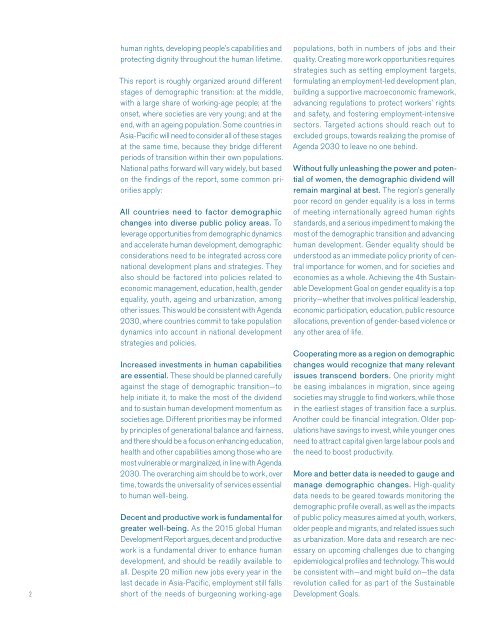SHAPING THE FUTURE HOW CHANGING DEMOGRAPHICS CAN POWER HUMAN DEVELOPMENT
23XELCz
23XELCz
Create successful ePaper yourself
Turn your PDF publications into a flip-book with our unique Google optimized e-Paper software.
2<br />
human rights, developing people’s capabilities and<br />
protecting dignity throughout the human lifetime.<br />
This report is roughly organized around different<br />
stages of demographic transition: at the middle,<br />
with a large share of working-age people; at the<br />
onset, where societies are very young; and at the<br />
end, with an ageing population. Some countries in<br />
Asia-Pacific will need to consider all of these stages<br />
at the same time, because they bridge different<br />
periods of transition within their own populations.<br />
National paths forward will vary widely, but based<br />
on the findings of the report, some common priorities<br />
apply:<br />
All countries need to factor demographic<br />
changes into diverse public policy areas. To<br />
leverage opportunities from demographic dynamics<br />
and accelerate human development, demographic<br />
considerations need to be integrated across core<br />
national development plans and strategies. They<br />
also should be factored into policies related to<br />
economic management, education, health, gender<br />
equality, youth, ageing and urbanization, among<br />
other issues. This would be consistent with Agenda<br />
2030, where countries commit to take population<br />
dynamics into account in national development<br />
strategies and policies.<br />
Increased investments in human capabilities<br />
are essential. These should be planned carefully<br />
against the stage of demographic transition—to<br />
help initiate it, to make the most of the dividend<br />
and to sustain human development momentum as<br />
societies age. Different priorities may be informed<br />
by principles of generational balance and fairness,<br />
and there should be a focus on enhancing education,<br />
health and other capabilities among those who are<br />
most vulnerable or marginalized, in line with Agenda<br />
2030. The overarching aim should be to work, over<br />
time, towards the universality of services essential<br />
to human well-being.<br />
Decent and productive work is fundamental for<br />
greater well-being. As the 2015 global Human<br />
Development Report argues, decent and productive<br />
work is a fundamental driver to enhance human<br />
development, and should be readily available to<br />
all. Despite 20 million new jobs every year in the<br />
last decade in Asia-Pacific, employment still falls<br />
short of the needs of burgeoning working-age<br />
populations, both in numbers of jobs and their<br />
quality. Creating more work opportunities requires<br />
strategies such as setting employment targets,<br />
formulating an employment-led development plan,<br />
building a supportive macroeconomic framework,<br />
advancing regulations to protect workers’ rights<br />
and safety, and fostering employment-intensive<br />
sectors. Targeted actions should reach out to<br />
excluded groups, towards realizing the promise of<br />
Agenda 2030 to leave no one behind.<br />
Without fully unleashing the power and potential<br />
of women, the demographic dividend will<br />
remain marginal at best. The region’s generally<br />
poor record on gender equality is a loss in terms<br />
of meeting internationally agreed human rights<br />
standards, and a serious impediment to making the<br />
most of the demographic transition and advancing<br />
human development. Gender equality should be<br />
understood as an immediate policy priority of central<br />
importance for women, and for societies and<br />
economies as a whole. Achieving the 4th Sustainable<br />
Development Goal on gender equality is a top<br />
priority—whether that involves political leadership,<br />
economic participation, education, public resource<br />
allocations, prevention of gender-based violence or<br />
any other area of life.<br />
Cooperating more as a region on demographic<br />
changes would recognize that many relevant<br />
issues transcend borders. One priority might<br />
be easing imbalances in migration, since ageing<br />
societies may struggle to find workers, while those<br />
in the earliest stages of transition face a surplus.<br />
Another could be financial integration. Older populations<br />
have savings to invest, while younger ones<br />
need to attract capital given large labour pools and<br />
the need to boost productivity.<br />
More and better data is needed to gauge and<br />
manage demographic changes. High-quality<br />
data needs to be geared towards monitoring the<br />
demographic profile overall, as well as the impacts<br />
of public policy measures aimed at youth, workers,<br />
older people and migrants, and related issues such<br />
as urbanization. More data and research are necessary<br />
on upcoming challenges due to changing<br />
epidemiological profiles and technology. This would<br />
be consistent with—and might build on—the data<br />
revolution called for as part of the Sustainable<br />
Development Goals.


